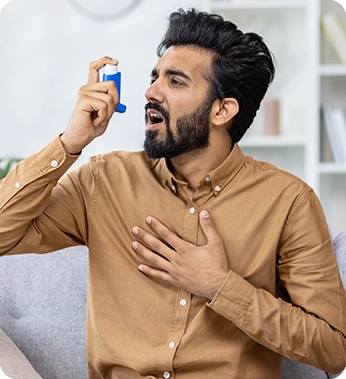Homeopathic Medicine for Asthma
Safe, Gentle & Long-Term Relief for Your Lungs
Book your Appointment
Dr Batra’s® offers a natural and effective solution for asthma by treating the root cause, strengthening your immunity, easing inflammation, and helping you breathe better without relying on steroids
In India, asthma affects over 3 crore people, and allergic asthma is among the most common respiratory conditions triggered by pollution, stress, or genetics. Many rely on inhalers, but homeopathy offers a sustainable approach with no side effects
Personalised Care with Expert Assessment
45-minute consultation with AI-powered analysis to create a customised asthma relief plan
Holistic Healing Approach
Homeopathy combined with diet advice and breathing techniques to support lung health
Targeted Plans for Every Asthma Type
Treatment customised to allergic, exercise-induced, or nocturnal asthma for long-term recovery
Lung Function Monitoring
Spirometer used to track breathing capacity and treatment progress
Visible, Measurable Outcomes
Results monitored through clinical photos and expert assessments
Root Cause Treatment:
Addresses inflammation, immune dysfunction, and emotional trigger
Side Effect-Free:
No steroids, no harsh chemicals, safe for all age
Long-Term Relief:
Restores lung health and reduces the need for frequent medications
Early signs of asthma include wheezing, coughing at night, shortness of breath, and chest tightness
To get long-lasting relief with homeopathy medicine for asthma prevention, our approach combines:
Lung Health Evaluation
Understands severity and triggers through AI-powered assessment
Personalised Remedy Plan
Remedies are matched to your lifestyle, stress, and environmental exposure
Immune Strengthening
Reduces allergic sensitivity and inflammation naturally
Diet & Lifestyle Adjustments
We recommend foods and habits that promote lung function
Stress Relief Support
Remedies that calm nerves and prevent asthma attacks triggered by emotions
Short Description: Triggered by exposure to allergens like pollen, dust, or pet dander.
Causes: Pollen, dust mites, pet dander, mold.
Symptoms: Wheezing, sneezing, chest tightness, runny nose.
How Homeopathy Helps: Reduces sensitivity to allergens and calms the overactive immune system.
Short Description: Asthma symptoms brought on by physical exertion.
Causes: Strenuous activity, cold or dry air during exercise.
Symptoms: Shortness of breath, coughing, chest tightness during or after activity.
How Homeopathy Helps: Strengthens lung capacity, improves stamina, and eases post-exercise recovery.
Short Description: Asthma attacks or symptoms that worsen at night.
Causes: Nighttime exposure to allergens, cold air, lying down position, hormonal changes.
Symptoms: Coughing, wheezing, disturbed sleep, breathlessness.
How Homeopathy Helps: Prevents night-time asthma attacks and balances the body’s stress response.
Short Description: Asthma triggered by workplace irritants.
Causes: Smoke, chemical fumes, dust, industrial allergens.
Symptoms: Breathing difficulty, coughing, wheezing during work hours.
How Homeopathy Helps: Detoxifies lungs, reduces inflammation, and supports daily respiratory health.

Step 1
Relief from coughing, reduced wheezing and breathlessness
Step 2
Better lung capacity and reduced triggers
Step 3
Emotional and immune support to stabilise breathing
Step 4
Long-term prevention using homeopathy medicine for asthma prevention
| Treatment Feature | Homeopathy | Conventional |
|---|---|---|
| Eases cough and breathing difficulty in asthma | ||
| Personalised treatments | ||
| No Side Effects | ||
| Long-Term Benefits | ||
| Treatment Duration | ||
| Suitability | ||
| Complementary Use |

The best homeopathic medicine for asthma depends on individual symptoms and triggers. Remedies like Natrum Sulph, Arsenicum Album, and Spongia are commonly used. A qualified doctor can recommend the best homeopathy medicine for asthma to ensure safe, personalized, and long-term relief
Yes, homeopathy medicine for asthma prevention helps reduce triggers, improve lung function, and strengthen immunity. By addressing the root cause, it lowers the frequency and severity of asthma attacks, making it a safe and natural approach for long-term management
No. Homeopathic medicine for asthma is prepared from natural sources and is gentle, non-toxic, and free from side effects. It is safe for all age groups and offers a holistic way to manage asthma symptoms without dependency on strong medications
Absolutely. Homeopathy for asthma is safe for children as it uses gentle remedies to strengthen their respiratory system. It helps reduce dependency on inhalers and steroids, providing effective long-term management of asthma symptoms in growing children
Yes, homeopathy works well alongside conventional treatments like inhalers. The best homeopathy medicine for asthma complements existing therapies, helping reduce the need for frequent inhaler use over time by targeting the root cause of asthma symptoms naturally